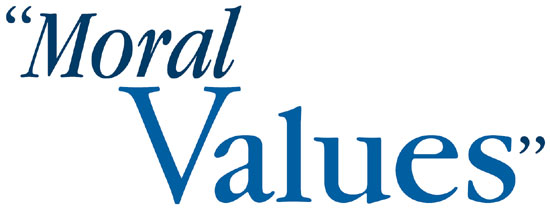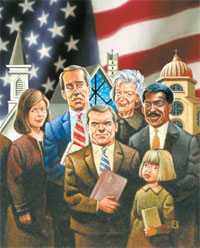Moral Values
Lincoln E. Steed January/February 2005
Getting your Trinity Audio player ready...

Can it really be so long since the U.S. presidential elections? What, all of two months! The attack rhetoric is all gone now and, uninterrupted by paid political ads, television programming is back to the usual numbing flicker. It's jingle bells and Auld Lang Syne and elections in Iraq for us.
But the political landscape has been rearranged in ways that go way beyond political structure and electoral votes. We seem to have discovered something big and previously unnoted. We have decided that moral values determined the outcome of the last election more than any other factor.
On the face of it that is an extraordinary conclusion to make of an election marked by more outright lies and malice than any in recent, or not so recent, memory. Character was often presented as a virtue—however it was more described in the negative; as both sides cast the other candidates as mean, dishonest, traitors—well, you remember.
I have to think hard to list many issues that could be called moral values. Let's allow character of the candidates right up front—and then put our thinking caps on. Well there was a lot of talk about same-sex marriage. (Those who read our September 2004 issue of Liberty know how seriously we view that challenge to religious prerogatives and society at large.) But both sides danced around that issue in public debate. The Republicans seemed to want it both ways by backing a federal constitutional amendment and allowing part of the ticket to almost defend the gay reality. And the Democratic candidate knew better than publicly espouse this issue. Still, on election day eleven states gave a resounding mandate for state constitutional amendments. . . so it was clearly a moral issue in play for the election.
Abortion was no doubt a big background issue, as it has been for several elections now. But it has never been determinative before; and the politicians showed little relish for making it the issue of the election. What was clearly on the voters' minds was stem cell research and the implications it holds for even more aggressive embryo manipulation. It is in many ways a puzzling line to draw in the sand. Still, it is a line, and I am heartened to see it as a sign that our society is interested in protecting life—and presumably in many cases this awareness arises from a sense of the Divine Creator.

So what were the truly significant moral issues at work here? It is indeed self evident that most have cast it that way, and it becomes an axiom to take forward with us—but I hold that other than the same sex/marriage issue it is not what it appears to be.
Certainly the preachers among us would accede readily enough that the United States is not in the midst of a Great Awakening. Spirituality is something too many Americans find to be unnecessary.
I think what is stirring is not so much an "enthusiasm" of the Spirit as it is a reawakening of a sense of national religious identity. Much the same way as the Islamic world, feeling under threat, is more and more defining itself in arbitrary religious ways. And they are headed for disaster in so doing. We too, in the "Christian" west, risk disaster if we allow an unthinking morals agenda to function as a substitute for spiritual revival and a true sense of self.
What are some of the present contradictions to a true values culture? After trying to tie down the often less than clear-cut moral issues in the election, this second quest is sadly a lot easier to conduct.
In many and myriad ways in the past several years, by government policy and public aceedence we have thumbed our noses at concern for the environment. I am no "greenie" to say this—just an observer of events: a Christian well aware that my Bible says that God will punish those who destroy the earth. I think it inconsistent that we should be developing a moral agenda even as we lay waste to the earth and flout our right to do so, above the concerns of other, less blessed, nations.
We daily note the ravages of big business and capital let loose to plunder and grow. Even as the poor are cast as socially irresponsible. The day should be past when we could dismiss government help for the poor as socialist and communistic. It reflects a hardening of public morality that we allow the diminishment of such an obligation.
Our proclamation of moral values has an increasingly surreal cast to the rest of the world. A world shocked by the brutality and immorality of Abu Graib. A world long lectured by us on the rights and dignity of man—and now at a loss to know why we are so dismissive of things like the Geneva Conventions and of the rights of our own citizens to public disagreement and demonstration.
It has often been a rude charge of our enemies that we act as we do in the Middle East because of uncritical favoritism. How must they think now to hear, as I did recently, a congressman say that he will support a certain state in that area because of his interpre-tation of prophecy—and would continue to do all in his power to support it even if it became despotic. And of course his comments were mild compared to some of the public voicing of religious leaders here who are politically ascendendant.
For much of the past century the United States shamed the rest of the Western world by its vibrant religious life—even as others descended into formalism and demythologizing. But now they must look askance at too many churchmen hungering for political power more than for true charity. They must wonder at the long term commitment to religious freedom from those all too ready to use the arm of the law and the public purse to advance their religious agenda. This in degree is a new paradigm for the United States.
The term "Moral Values" surely must take on a proper context or it could act as the empowerment for the most immoral and antidemo-cratic tendencies. It is always worth remembering that the most problematic regimes in the last century—ones like the Third Reich, Pol Pot's Cambodia and the Soviet system—traded and grew on the mantra of moral values alone. Without a consistent spiritual vision, without the love for others that all true faith engenders, the most startling inhibitions of humanity are possible; indeed likely.
"Religion Without Freedom" is a reality for much of our world. Let it never be the case for the United States of America. We seem to have launched morality without
spirituality. Let us not allow that to stand.


Lincoln E. Steed
Editor,
Liberty Magazine
This is a big year for Liberty magazine. We are filling out our One Hundredth Year of continuous publication! You will have noted that our cover carries memories of some of the issues over that time; and the designation "Volume 100, Number 1." Come along with us for a landmark year. More in upcoming issues.
Article Author: Lincoln E. Steed
Lincoln E. Steed is the editor of Liberty magazine, a 200,000 circulation religious liberty journal which is distributed to political leaders, judiciary, lawyers and other thought leaders in North America. He is additionally the host of the weekly 3ABN television show "The Liberty Insider," and the radio program "Lifequest Liberty."